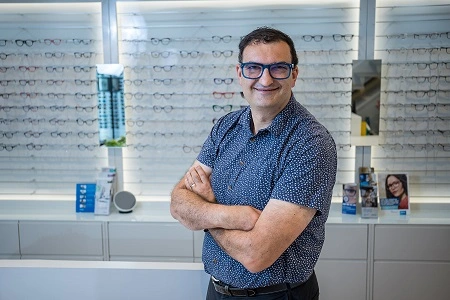Understanding the Vital Connection Between Obesity and Eye Health
When discussing health complications, the focus often gravitates towards serious ailments like diabetes, cardiovascular diseases, and joint pain. However, a critical aspect that is frequently overlooked is eye health. The well-being of your eyes is as vital as that of essential organs like the heart and kidneys, as they rely heavily on an efficient vascular system. Compromised blood flow can lead to severe repercussions for your eyesight. Therefore, prioritising optimal eye health is crucial for sustaining a high quality of life, as the state of your eyes can often indicate broader health concerns brewing within your body.
At Eyes By Design, we consistently witness how changes in systemic health manifest in our patients' vision. Vision-related issues rarely exist in isolation; they often reveal underlying health conditions that require immediate attention and proactive management. Grasping the deep connection between your overall health and visual clarity empowers you to take deliberate actions to enhance both your health and eyesight.

Examining the Intricate Relationship Between General Health and Eye Wellness
Your eyes, though small, are highly vascularised and depend on a steady supply of oxygen and essential nutrients to function optimally. Individuals who are classified as overweight or obese often experience metabolic and inflammatory processes that can adversely affect these sensitive tissues. Such disturbances may lead to a range of eye health problems that often go unnoticed until significant damage has occurred, resulting in irreversible consequences. Recognising these processes is vital for timely intervention and prevention, ensuring that any potential issues are addressed before they escalate.
It is important to understand that the effects of these health changes do not typically manifest immediately. Instead, they develop gradually and often remain unnoticed until vision quality diminishes significantly. This highlights the necessity of regular eye examinations and the need to be acutely aware of how your general health can directly impact your vision. Consistent check-ups are instrumental in identifying potential issues before they advance into more serious conditions that could jeopardise your eyesight.
Recognising Eye Conditions Associated with Obesity
Diabetic Retinopathy
Excess weight significantly elevates the risk of developing type 2 diabetes, which can lead to chronic high blood sugar levels that damage the tiny blood vessels in the retina, resulting in a condition known as diabetic retinopathy. This condition stands as one of the leading causes of vision loss among working-age adults and may progress without any noticeable symptoms. Therefore, regular eye exams are crucial for anyone managing diabetes or those at risk of developing this serious condition, as early detection can substantially reduce potential risks to vision.
Glaucoma
Glaucoma is characterised by increased intraocular pressure that can potentially damage the optic nerve. While this condition can affect individuals from all walks of life, research indicates a notable correlation between obesity and heightened intraocular pressure. This relationship may stem from alterations in fluid dynamics within the eye or variations in blood circulation. Often, glaucoma remains asymptomatic in its initial stages, which can lead to irreversible vision loss if not diagnosed and treated promptly. Regular eye examinations are instrumental in facilitating early detection and management of this condition.
Age-Related Macular Degeneration
The macula, an essential part of the retina responsible for sharp central vision, can be adversely affected by obesity. Several studies suggest that being overweight may hasten the progression of macular degeneration due to heightened inflammation and oxidative stress. This condition can obstruct vital daily activities such as reading, recognising faces, and driving—all essential for maintaining independence and quality of life.
Cataracts
While aging is typically the primary cause of cataracts, individuals struggling with obesity often face an increased risk of developing them prematurely. Factors such as inflammation and insulin resistance may instigate changes within the eye’s lens, leading to clouding and vision impairment. Although cataracts can be effectively managed through surgical intervention, early detection remains crucial for ensuring optimal outcomes and preserving vision over time, underscoring the importance of routine eye care.
Examining the Connection Between Sleep Apnoea and Eye Health
Obesity is widely recognised as a significant risk factor for sleep apnoea, a serious condition that can drastically diminish oxygen flow during sleep, adversely affecting sleep quality. Untreated sleep apnoea has been associated with various eye conditions, including:
- Floppy Eyelid Syndrome
- Glaucoma
- Non-arteritic Anterior Ischaemic Optic Neuropathy
Moreover, sleep apnoea can exacerbate dry eye symptoms, particularly in individuals using CPAP machines. If the mask experiences leaks or directs airflow towards the eyes, moisture levels on the ocular surface may diminish overnight, leading to discomfort upon waking and negatively impacting overall eye health.

Addressing Dry Eye Symptoms and General Eye Discomfort
A significant number of individuals dealing with obesity report experiencing increased instances of dry eye symptoms and eye strain. These conditions may stem from hormonal fluctuations, systemic inflammation, or even the medications prescribed to manage associated health issues. While these symptoms may not always present as severe, their effect on one's quality of life can be considerable, necessitating thorough assessment and effective management strategies to alleviate discomfort and enhance overall eye health.
Implementing Key Strategies to Improve Your Vision
Prioritise Regular Eye Examinations
For individuals managing high blood pressure, diabetes, or other chronic conditions, regular eye exams are not just recommended; they are essential for maintaining eye health. At Eyes By Design, we conduct comprehensive assessments that go beyond merely providing a prescription; we perform detailed examinations of the retina, optic nerve, and the overall vascular health of your eyes to ensure that any potential issues are identified early. This proactive approach is vital for safeguarding your vision and preventing future complications.
Enhance Your Diet for Optimal Eye Health
Embracing a balanced diet rich in leafy greens, vibrant vegetables, healthy fats, and whole grains can significantly boost both your metabolic and ocular health. Nutrients such as lutein, zeaxanthin, omega-3 fatty acids, vitamin E, and zinc are well-documented for their protective properties against age-related vision changes and for supporting overall eye health, thereby contributing to long-term wellbeing.
Incorporate Regular Physical Activity into Your Daily Routine
Engaging in consistent physical activity not only enhances blood circulation but also reduces systemic inflammation and helps regulate blood sugar levels. Even modest daily movements can yield significant benefits for your vision, contributing to improved overall health and vitality, which can have a lasting impact on your quality of life and eye health.
Effectively Manage Systemic Risk Factors
Maintaining healthy levels of blood sugar, blood pressure, and cholesterol is crucial in slowing the progression of obesity-related eye diseases and significantly reducing the risk of vision loss. Taking proactive steps to address these factors is essential for preserving your eye health and enhancing your quality of life, allowing you to enjoy clearer vision as you age.
Prioritise Your Vision Health as a Fundamental Aspect of Your Wellbeing
Your eye health is integral to your overall wellbeing. Many changes related to vision can occur subtly and without obvious warning signs. Adopting a proactive approach to eye care and health can lead to significant improvements, ensuring that any necessary early detection and intervention can be made when required, ultimately safeguarding your eyesight for the future.

Your Eyes Reflect Your Overall Health—Join Us in Protecting Them Throughout Every Life Stage
If you are managing chronic health conditions or have noticed changes in your vision, Eyes By Design is here to support you. Our approach is compassionate and non-judgmental; we provide professional care with a sincere commitment to helping you achieve long-term clarity in your vision. Prioritising your eye health is essential, and we are dedicated to being an integral part of your health journey, guiding you towards improved vision.
Explore Related Topics
If you are considering options like GLP-1 medications in your weight management journey, understanding their potential effects on your vision is crucial. We have extensively examined the ocular implications of Ozempic in our detailed article: Ozempic and Vision Health Implications.
This article aims to enrich understanding of general eye health topics.
It should not replace professional advice, diagnosis, or treatment.
Always consult your healthcare provider before incorporating this information into your health regimen.

Dr Nicholas Altuneg
For over twenty years, my passion has been focused on empowering individuals of all ages to improve their lives through enhanced vision. At Eyes By Design, we believe that vision transcends mere clarity or the ability to read fine print; it shapes your perceptions and reactions at every moment of your daily life.
Read more about Dr Nick
The Article: Obesity’s Impact on Eye Health: What You Need to Know first appeared on https://writebuff.com
The Article Obesity’s Effect on Eye Health: Essential Insights Was Found On https://limitsofstrategy.com
The Article Obesity’s Impact on Eye Health: Key Insights to Know found first on https://electroquench.com

